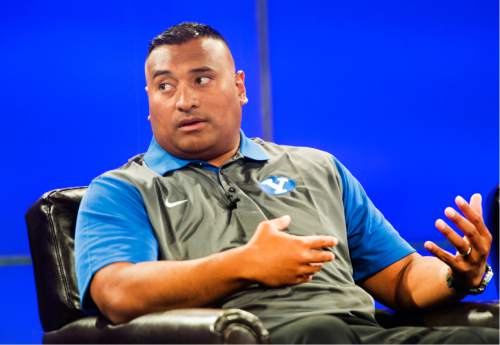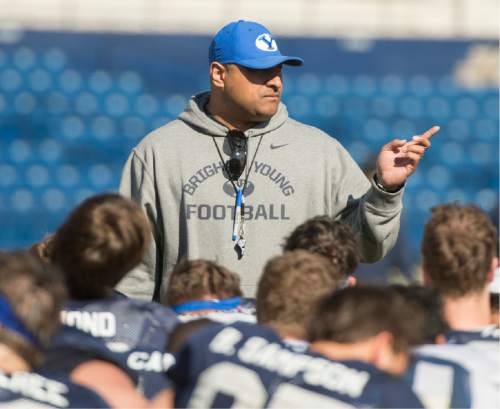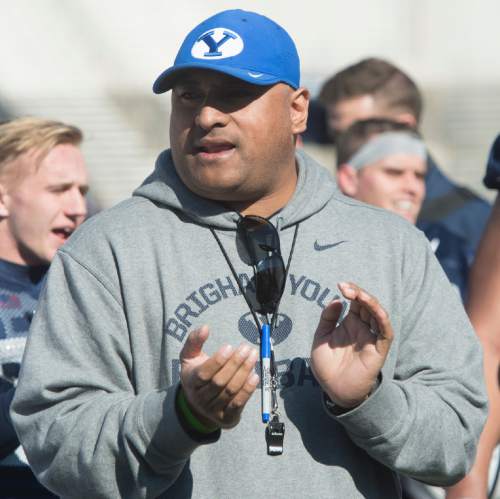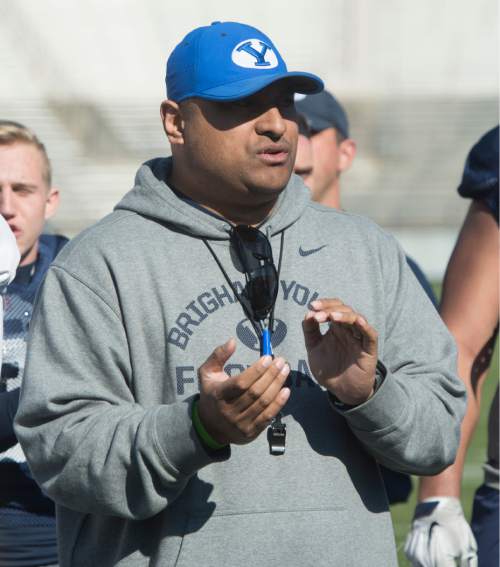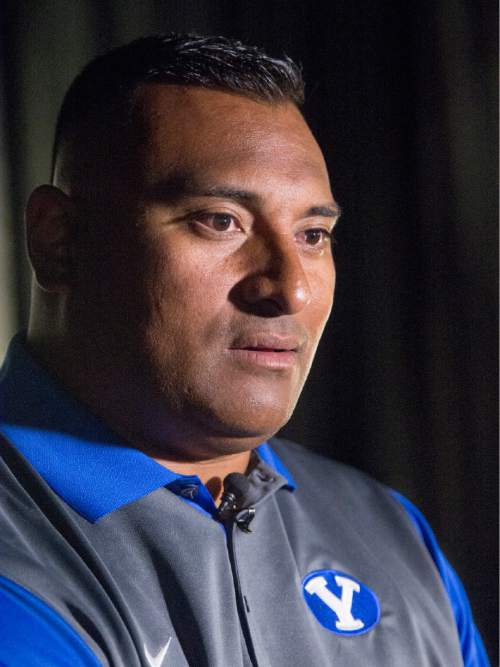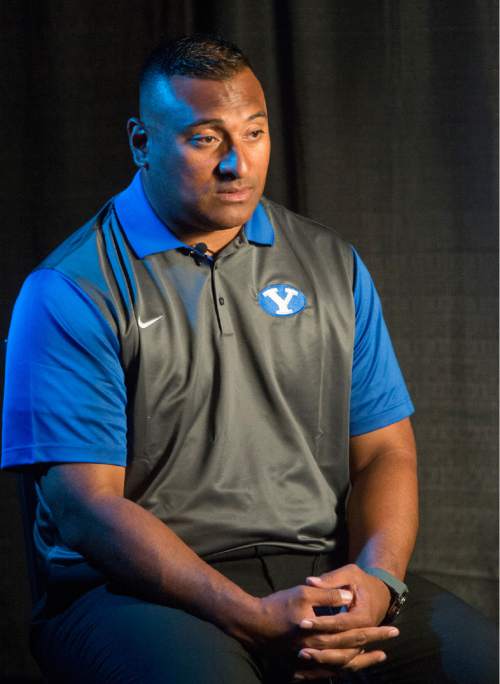This is an archived article that was published on sltrib.com in 2016, and information in the article may be outdated. It is provided only for personal research purposes and may not be reprinted.
Provo • About 28 years before he was named the 14th head coach in BYU football history last December, 12-year-old Kelaokalani Fifita Sitake walked the streets of Provo with a large, black plastic garbage bag slung over his shoulder filled with clothes. He was often followed closely by his three younger siblings — 10-year-old Toakase, 8-year-old Pamrose and 7-year-old T.J. — who were also carrying garbage bags.
The Sitake kids weren't homeless, although Toakase (who goes by "Toa") Sitake surmises that some people might have taken a glance at them and figured as much.
Rather, the family did not have laundry baskets, and the four children of Tongan immigrant Tomasi "Tom" Sitake, a single-parent divorcee who moved his four children from Laie, Hawaii, to Utah when Kalani was 9 or 10, would make the weekly, four-block trek along 500 East from their modest two-bedroom, one-bathroom apartment to do laundry at the Wash Hut. It was just blocks away from the BYU campus where one day Kalani would take the private school's most high-profile job and become the first person of Tongan descent to oversee a major college football program.
"Kalani would make it a fun thing, a motivational thing, kind of a coaching thing, so he didn't have to carry all the bags himself," said Toa, now a social worker in Utah. "He would make a game out of it, to see who was the strongest, or the fourth-strongest, or whatever. He would never say, 'you are the weakest,' or anything like that. It was always positive, encouraging words."
Family members say it was moments like those that prepared Kalani Sitake, now 40, to take the reins from Bronco Mendenhall over a program that is at a crossroads, a program that desperately needs a strong leader to guide it through a second phase of independence in a college football landscape that tilts heavily toward Power 5 conference schools.
"He's ready. He's prepared," said his father, Tom. "But most of all he's grateful, and he's humbled by the opportunity."
Asked to name a trait that has carried his son to the top of his profession, Tom Sitake said it is Kalani's respectfulness to those who have gone before him, people such as his grandfather, Nafe, who migrated to the United States from Tonga many years ago, and his coaching mentors, most notably LaVell Edwards, Kyle Whittingham and Gary Andersen.
Kalani Sitake says he is in this position only because of the sacrifices made by those who went before him — his father, his grandfather, and many other Pacific Islanders and family members who rose from humble circumstances and paved the way. Sitake is just the third Polynesian to head up a Division I football team, joining Navy's Ken Niumatalolo and former Hawaii coach Norm Chow.
"I think a lot of things happen in your life that prepare you for this moment," he said. "Yeah, being the oldest [sibling] prepared me to have more responsibilities and stuff like that. I don't know how it prepared me, but I know I am the person I am because of the experiences I had. But more important is the sacrifices that others made towards my success. … There are a lot of people that had it harder than me."
Working while other kids played
Another of Sitake's confidants, former BYU and NFL star Vai Sikahema, told The Salt Lake Tribune before his induction into the Polynesian Football Hall of Fame in January that Sitake's hiring was a great source of pride for Polynesians, and specifically Tongans, everywhere.
"I can't stop smiling about it," Sikahema said.
Toa Sitake, two years younger than Kalani, said it is common in the Tongan culture for the oldest child to assume a parenting role as the "second mother or second father," but Kalani's situation was made even more difficult because Tom Sitake was a single parent who had to work long hours outside the home, mostly as a security guard. Many times Kalani had to cook and prepare meals, clean the apartment, and do other household chores when other kids his age were outside playing, she said.
"It was just what I knew, the only thing I knew," Kalani said. "I didn't see it as being difficult. That's just what you deal with, you know?"
Funds were so tight during those days in Provo that the family couldn't afford to send Kalani and T.J. to football camps, Toa recalled, so Tom Sitake — who slept on the couch in the living room — would buy little orange cones, jump ropes and other equipment at Deseret Industries and train his sons himself at a nearby junior high on weekends and after work. Or he would take them to the BYU campus and have them run the long gauntlet of stairs that connects the lower campus to the upper one.
"If there was an obstacle in the way, Pops and K [Kalani] always found a way to overcome it, make something good happen," Toa said. "I get reminded of how far K has come when I recall what we came from was a struggle — really humbling circumstances. We didn't have the nicest cars or the nicest homes, but we grew up with a whole bunch of love. My dad always instilled that in us."
He would also frequently tell Kalani that the reason he was born first was so he could take care of his three siblings when "Pops" wasn't around. Kalani also looked after others in unfortunate situations. The Sitake sisters tell a story about how they were walking home from school one day and 13-year-old Kalani noticed some bullies picking on an overweight, poorly dressed youngster. Kalani stood up to the bullies, despite being outsized and outnumbered, and then told the bullied youngster to meet him at the same place every day after school so Kalani could walk him home safely.
"I just thought that was normal, growing up," Toa said. "It wasn't until my junior high years that I realized everyone's big brother wasn't like how my big brother was."
Speaking of cars, one particular beater's heater would not shut off, creating oven-like conditions in the summer. But the family dealt with it, and felt fortunate to just have a mode of transportation. Now, Sitake is making an estimated $1.5 million a year to coach the Cougars.
"I am still in awe that he's the head football coach at BYU," Toa said. "But I'm not surprised."
Tough times, happy memories
Through it all, Kalani went out of his way to put his siblings first, a tradition he even carried on as a scholarship football player at BYU when he would send part of his scholarship checks home to pay for utility bills and the like.
"Kalani was always a conscientious, caring individual concerned for the welfare of those around him," said Tom Sitake, who shares a story of how Kalani would make sure every kid got a drink from the water fountain at school before recess ended, often standing at the back of the line and missing his own opportunity for refreshment because the bell would ring.
"As a kid, he was very, very kind to people," Tom said. "He was always willing to help. And I never heard him complain. Not once."
Tom Sitake worked as a security guard back then — many times through the night so he could spend time with his children during the day — but is now the director of vocational rehabilitation at the Utah State Hospital. He stressed education first and foremost, insisting that the children do their homework before running out to play after school.
During the summer, Tom would often drop his children off at the library and instruct them to read a book and have a book report prepared when he picked them up later that day.
Toa said that routine drove her nuts at the time, but acknowledges now that the emphasis on education paid off: All four siblings earned college degrees, Toa in social work, Pamrose in nursing and T.J. in sociology. Kalani is a voracious reader, and his wife, Timberly, talks about the moving trucks being loaded with books when they arrived in Provo from Corvallis, Ore., where Kalani was the Oregon State defensive coordinator.
For his part, Kalani brushes off suggestions that he had a rough childhood and was forced to grow up fast.
"My childhood memories are all positive," he said. "My favorite [memories] are just basically playing pickup football. That's what I did my whole early life — in Hawaii, and over here. Not having all the gear, playing tackle football with no pads on — just playing ball.
"Those were the days that you would play until the sun went down and your parents would have to call you home. Everyone would be screaming for their kids to come home, and you would be playing until you literally could not see the ball anymore. We played everything — football, basketball, capture the flag, all that stuff. So yeah, those are my best childhood memories."
BYU through and through
Attending BYU football games was also high on the list of memories, although Tom Sitake says there were times when the family could not afford tickets and would gather outside Cougar Stadium — now LaVell Edwards Stadium — and listen to the game on the radio until the gates were opened shortly after halftime.
"Kalani was always a huge BYU fan," Tom Sitake said. "He just loved BYU since he was little."
Kalani played for Timpview High his freshman and sophomore seasons, then the family moved to Missouri and he played his junior and senior seasons at Kirkwood High in the St. Louis area. Scholarship offers from major Midwest football powers such as Notre Dame and Iowa poured in for the athletic, well-built linebacker and fullback, but he chose BYU, he says, largely because of Edwards.
The legendary coach, who retired in 2000, remembers Sitake as a smart, studious player who was always willing to put his teammates before himself. Sitake had 83 carries and 62 catches as a Cougar, but scored just one touchdown, which came during his sophomore season in 1998. That's because he blocked for some of the most prolific ball carriers in school history: Jamal Willis, Hema Heimuli, Mark Atuaia, Marcus Whalen and Reno Mahe, to name a few.
"He was always really competitive and had a deep desire to succeed, to win," Edwards said. "I felt like if he ever got into coaching, he would make a great coach."
That happened after Sitake gave the NFL a try. A laundry list of injuries derailed those plans, and he "caught the coaching bug," he said, when he was offered a spot on the staff at Eastern Arizona College. From there, he was a graduate assistant at BYU for a year before moving on to Southern Utah University, then Utah. After 10 years at the U., Sitake joined Andersen at Oregon State as that school's defensive coordinator.
A year later, BYU came calling, and Sitake and his family were back home.
"Kalani bringing that family feel to BYU football is just an extension of what he learned in the home," Toa Sitake said.
Twitter: @drewjay —
Kalani Sitake timeline
Important dates in the life BYU football coach Kalani Sitake
1975 • Born on Oct. 10, 1975, in Nuku'alofa, Tonga, moved to Hawaii a few weeks later
1985 • Moved from Laie, Hawaii, to Utah at the age of 9 with his father, Tom, and three younger siblings
1994 • Enrolled at BYU as a freshman fullback under coach LaVell Edwards after playing his final two seasons of high school football in Kirkwood, Mo.
1995-97 • Served a two-year LDS Church mission to Oakland, Calif.
2000 • Graduated from BYU with a degree in English after a four-year playing career
2001 • Started his coaching career at Eastern Arizona after a back injury cut short his professional career
2003 • Worked as a running backs coach and tight ends coach at Southern Utah University
2005 • Joined Kyle Whittingham's staff at the University of Utah
2009 • Promoted to Utah's defensive coordinator
2015 • Joined mentor Gary Andersen as Oregon State's defensive coordinator
2015 • Named BYU's head coach, replacing Bronco Mendenhall, on Dec. 19, 2015, at the age of 40


